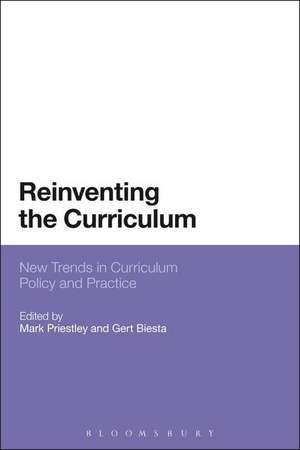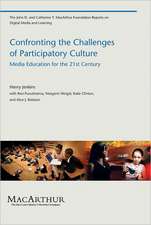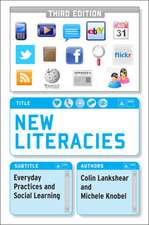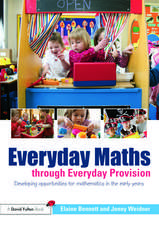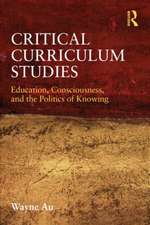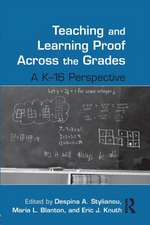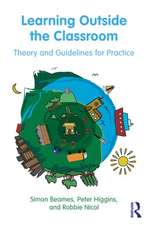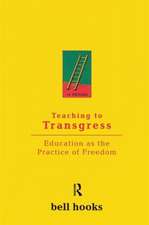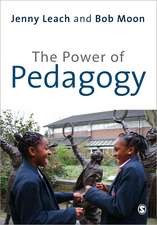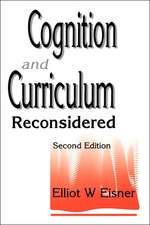Reinventing the Curriculum: New Trends in Curriculum Policy and Practice
Editat de Dr Mark Priestley, Professor Gert Biestaen Limba Engleză Hardback – 19 iun 2013
| Toate formatele și edițiile | Preț | Express |
|---|---|---|
| Paperback (1) | 257.50 lei 6-8 săpt. | |
| Bloomsbury Publishing – 17 dec 2014 | 257.50 lei 6-8 săpt. | |
| Hardback (1) | 832.26 lei 6-8 săpt. | |
| Bloomsbury Publishing – 19 iun 2013 | 832.26 lei 6-8 săpt. |
Preț: 832.26 lei
Preț vechi: 1065.82 lei
-22% Nou
Puncte Express: 1248
Preț estimativ în valută:
159.35€ • 165.93$ • 132.21£
159.35€ • 165.93$ • 132.21£
Carte tipărită la comandă
Livrare economică 13-27 februarie
Preluare comenzi: 021 569.72.76
Specificații
ISBN-13: 9781441137647
ISBN-10: 1441137645
Pagini: 256
Dimensiuni: 156 x 234 x 20 mm
Greutate: 0.52 kg
Ediția:New.
Editura: Bloomsbury Publishing
Colecția Bloomsbury Academic
Locul publicării:London, United Kingdom
ISBN-10: 1441137645
Pagini: 256
Dimensiuni: 156 x 234 x 20 mm
Greutate: 0.52 kg
Ediția:New.
Editura: Bloomsbury Publishing
Colecția Bloomsbury Academic
Locul publicării:London, United Kingdom
Caracteristici
A thorough analysis of curriculum policy and development, covering history, theory, policy, politics.
Notă biografică
Mark Priestley is Professor of Education at the University of Stirling, UK. He is a member of the Council of the British Educational Research Association.Gert Biesta is Professor of Educational Theory and Policy in the Faculty of Language and Literature, Humanities, Arts and Education at the University of Luxembourg, Luxembourg. He is editor-in-chief of Studies in Philosophy and Education.
Cuprins
1. Introduction: The New Curriculum, Mark Priestley (University of Stirling, UK) and Gert Biesta (University of Luxembourg, Luxembourg)2. The Origins and Development of Curriculum for Excellence: Discourse, Politics and Control, Walter Humes (University of Stirling, UK)3. Capacities and the Curriculum, Gert Biesta (University of Luxembourg, Luxembourg) and Mark Priestley (University of Stirling, UK)4. The Successful Learner: A progressive or an Oppressive Concept?, Jenny Reeves (University of Stirling, UK)5. Confident Individuals: The Implications of an 'Emotional Subject' for Curriculum Priorities and Practices, Kathryn Ecclestone (University of Sheffield, UK)6. Responsible Citizens: Citizenship Education between Social Inclusion and Democratic Politics, Gert Biesta (University of Luxembourg, Luxembourg)7. Effective Contributors: Evaluating the Potential for Children and Young People's Participation in their Own Schooling and Learning, E. Kay M. Tisdall (University of Edimburgh, UK)8. Emerging International Trends in Curriculum, Claire Sinnema (University of Auckland, New Zealand) and Graeme Aitken ((University of Auckland, New Zealand)9. Developing the Teacher - or Not?, Ian Menter (University of Oxford, UK) and Moira Hulme (University of Glasgow, UK)10. Teachers as Agents of Change: Teacher Agency and Emerging Models of Curriculum, Mark Priestley (University of Stirling, UK), Gert Biesta (University of Luxembourg, Luxembourg) and Sarah Robinson (Aarhus University, Denmark)11. High Stakes Assessment and New Curricula: A Queensland Case of Competing Tensions in Curriculum Development, Bob Lingard (University of Queensland, Australia) and Glenda McGregor (Griffith University, Brisbane, Australia)12. A Curriculum for the Twenty-First Century?, Gert Biesta (University of Luxembourg, Luxembourg) and Mark Priestley (University of Stirling, UK)Index
Recenzii
As Priestley and Biesta note, there is currently something of a renaissance of interest in curriculum - and this volume makes a very fine contribution to that discussion. The book examines carefully but provocatively many of the features and tensions flagged in current curriculum reforms internationally - the concerns about more child-centred and active learning; the active role of the teacher; the aim to build particular types of individuals for the 21st century; the policy concerns with economics and measurement. This is an important, provocative and beautifully readable collection.
This book marks a distinct turn in substantive books about curriculum - it moves us from a generation of books about competing models of curriculum design to a more intense, empirical and grounded account of Scotland's ground breaking Curriculum for Excellence. In addition it provides both fascinating international comparisons and significant critique of some popular curriculum concepts - this book has a razor sharp edge and cannot be read without being forced to re-examine many comfortable assumptions about curricula around the world.
Reinventing the Curriculum provides an up-to-date and valuable text for those interested in trends in curriculum policy and practice and the ever accompanying tensions and contradictions in curricular conversations. The book provides a much appreciated analysis of Scotland's Curriculum for Excellence and places the Scottish approach in a more international perspective. The authors successfully encourage the reader to become critically engaged with the direction of curriculum for the 21st century.
Reinventing the Curriculum is an essential text for all curriculum scholars and teachers who wish to understand and explore 21st century curriculum making. Grounded in a case study of Scotland's Curriculum for Excellence and against the backdrop of international trends, the authors present a critical analysis of the educational legitimacy, purpose and value of current initiatives. In doing so, they remoralize, repoliticize and revitalize conversations about curriculum development.
This book marks a distinct turn in substantive books about curriculum - it moves us from a generation of books about competing models of curriculum design to a more intense, empirical and grounded account of Scotland's ground breaking Curriculum for Excellence. In addition it provides both fascinating international comparisons and significant critique of some popular curriculum concepts - this book has a razor sharp edge and cannot be read without being forced to re-examine many comfortable assumptions about curricula around the world.
Reinventing the Curriculum provides an up-to-date and valuable text for those interested in trends in curriculum policy and practice and the ever accompanying tensions and contradictions in curricular conversations. The book provides a much appreciated analysis of Scotland's Curriculum for Excellence and places the Scottish approach in a more international perspective. The authors successfully encourage the reader to become critically engaged with the direction of curriculum for the 21st century.
Reinventing the Curriculum is an essential text for all curriculum scholars and teachers who wish to understand and explore 21st century curriculum making. Grounded in a case study of Scotland's Curriculum for Excellence and against the backdrop of international trends, the authors present a critical analysis of the educational legitimacy, purpose and value of current initiatives. In doing so, they remoralize, repoliticize and revitalize conversations about curriculum development.
